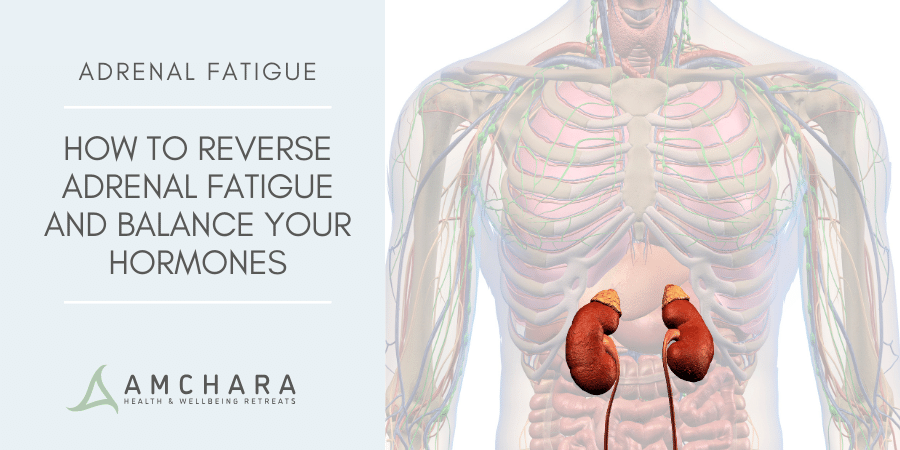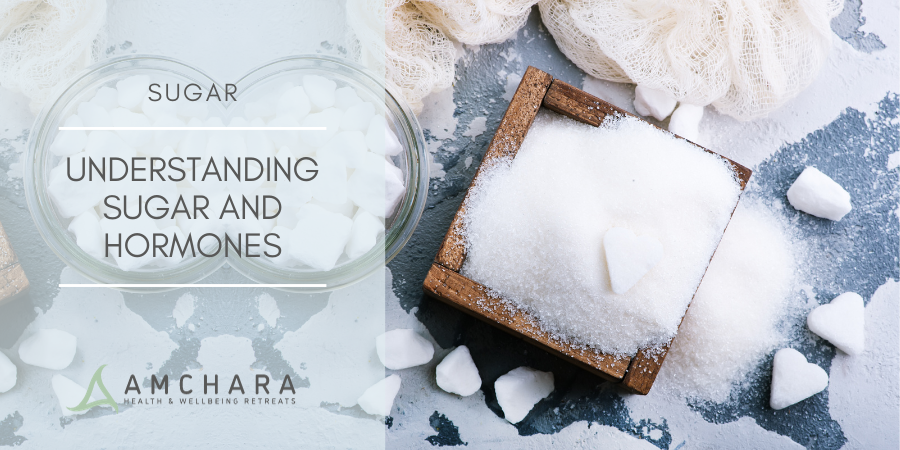Adrenal Function | Stress | Symptoms | Tests | Treatments | Diet | Resources
Introduction
‘Adrenal fatigue’ occurs as a result of the body’s inability to adapt to long term stress, which can leave the adrenal glands exhausted.
At Amchara, we always take an evidence-based approach to guiding you through the health landscape, and aim to provide you with actionable knowledge and tips to help you on your journey to optimal health.
In this article, we take a closer look at adrenal fatigue, what causes it, symptoms you might expect to see, what the consequences are, and natural steps you can take to re-balance your hormones and reverse adrenal fatigue
The topics we cover in more detail in this article are:
- How the Body Copes with Stress
- Understanding Adrenal Function
- Stress and Hormone Balance
- Stages of the Stress Cycle
- Symptoms of Adrenal Fatigue
- What are the Tests for Adrenal Fatigue?
- How to Correct an Imbalance of Stress Hormones
- Adrenal Fatigue Diet
On a daily basis the average person comes under some degree of pressure from different areas of their life.
A little pressure is normal and manageable; control mechanisms in the body are geared towards counteracting everyday stressors in life. Some people thrive under pressure and find it a positive motivational force.
However, for others – if the pressure becomes too extreme or frequent it can be perceived as stress which has negative effects and can take its toll on both physical and mental health.
How the Body Copes with Stress
Stress is defined as a state of mental or emotional strain or tension resulting from adverse or demanding circumstances, and prolonged stress may be a factor in the development of disease.
The human body reacts to perceived threats, triggering what’s known as a ‘fight or flight’ mechanism, which prepares you to engage in confrontation or run from danger.
This response involves a complex series of events, both biochemical and hormonal in nature, in which adrenaline and other ‘stress’ hormones are involved.
These specific hormones are controlled and regulated by your adrenal glands and nervous system.
It is important to note that your adrenals react to all types of stress in the same way, regardless of the source. Chronic levels of stress hormones can lead to an imbalance in your adrenal function, which may result in ‘adrenal fatigue’.
Once you have reached a state of adrenal fatigue your body’s coping mechanisms can be overwhelmed and the adrenal glands may no longer be able to meet the demands placed upon them.
Understanding Adrenal Function
The adrenals are two small glands that sit just above the kidneys.
Even though each only weighs approximately 4 grams they have a significantly high rate of blood flow and contain the highest levels of vitamin C per gram of any tissue in the body.
Each adrenal gland is composed of two distinctly different zones: the large outer cortex, and the smaller inner medulla, which secrete different classes of hormones:
1. Adrenal Medulla
Produces the hormones adrenaline (epinephrine) and noradrenaline (norepinephrine) and dopamine.
2. Adrenal Cortex
Produces the hormones cortisol, dehydroepiandrosterone (DHEA) and aldosterone.
Adrenaline, DHEA and cortisol are the body’s three major stress hormones. The adrenal glands are also an important source of sex hormones such as oestrogen and testosterone.
ADRENALINE
- The secretion of adrenaline, along with noradrenaline, is governed by the sympathetic nervous system and triggered in response to an immediate threat. The impact of adrenaline release is characterised by greater blood flow to the muscles, pupil dilation, increased blood glucose levels and an increased heart rate. Noradrenaline has a similar role within the body, increasing arousal and overall wakefulness and responsiveness.
CORTISOL
- The other player in the stress cycle is cortisol. It is released during times of stress to help your body gain energy and better deal with an emergency situation, increasing the body’s capacity to withstand stress. The effects of cortisol are felt over almost the entire body, and the intensity of the stress response is mainly due to cortisol.
- Cortisol controls fat, protein and carbohydrate metabolism and hence energy production from food. It increases blood sugar, regulates blood pressure, affects immune function, and thyroid hormone activity.
- Cortisol is secreted in a circadian rhythm, regulated by the sleep-wake cycle. Typically, there is a steep increase in the early morning, followed by a gradual decline up until midnight when circulating levels are at their lowest. High cortisol levels at night will cause insomnia.
DHEA (dehydroepiandrosterone)
- This is the most abundant steroid and precursor hormone in the human body.
- It’s converted in the ovaries into female hormones (oestrogens) and in the testes into male hormones (androgens).
DHEA helps to counteract the negative effects of prolonged high cortisol levels, such as immune suppression and damage to brain cells through over-stimulation.
It functions to control stress, build lean tissue, and reduce fat and maintain proper mineral balance in the body.
Levels start to decline at around the age of 20 years.
DHEA and cortisol are produced at different times during the day – cortisol levels should be highest in the morning and lowest at night.
Too much stress for too long results in stress hormone imbalance.
Any abnormality in adrenal rhythm can disturb vital body functions and lead to serious health problems.
The function of the adrenal glands is not just confined to regulating the fight or flight stress response – they also maintain many other metabolic processes including the following:
- Managing blood sugar levels
- Regulating salt and water balance
- Maintaining pregnancy
- Regulating inflammation
- Initiating and controlling sexual maturation during puberty
Stress and Hormone Balance
There is a hormonal connection to stress. When stress hormone imbalance is understood, stress levels can more easily be brought under control.
Chronic stress can impact the body in a number of ways:
- Supresses the immune system
- Slows down the digestive system
- Depletes the body of nutrients
- Slows the body’s rate of repair
- Negatively affects thyroid, pancreas, liver, kidney, reproductive and brain function
- Contributes to depression
- May lead to comfort eating
- Promotes anxiety
- May lead to dependency on drugs or alcohol
Stages of the Stress Cycle
In order to appreciate the links between adrenal dysfunction, hormone imbalance and poor health, we first need to understand how the body adapts to stressful situations.
There are three recognised stages of the stress cycle:
1. The Alarm Stage
This is the initial fight or flight response to an acute stressor and can be likened to a shock or fright.
It may also be an event that affects the body and taxes the adrenals – such as infections, chemical toxins, stimulants, poor nutrition, physical trauma, poor sleep habits or allergies.
Stress triggers the release of adrenaline, cortisol and DHEA.
The alarm response is a short-term defence mechanism designed to prepare the body for a crisis.
It is characterised by responses such as an increase in heart rate, profuse sweating, quicker breathing, elevated blood sugar, and muscle tension.
It is usually short-lived but once over the recovery can last for 24-48 hours and as stress hormones plummet this can lead to feelings of fatigue and exhaustion.
This is measured by high levels of both cortisol and DHEA.
2. The Resistance Stage
This is the stage where most people suffering from stress are trying to adapt. If stress continues then the body carries on producing cortisol, but produces less DHEA.
More of the body’s resources are utilised to produce greater amounts of cortisol at the expense of other steroid hormones such as oestrogen, progesterone and testosterone.
This is often why those suffering from stress are seen to produce lower levels of the sex hormones.
As the body adapts to high cortisol levels, the brain stops responding, due to a dulled sensitivity to the stress.
But instead of switching off the production of cortisol, it continues even when stress is not present.
When hormone levels are measured at this stage, the levels of cortisol in relation to DHEA are much higher.
Elevated cortisol is linked to the development of many disease situations such as ulcers, cancer, heart attacks, Alzheimer’s, hypertension, MS, and diabetes, as well as premature ageing and depression.
Stress is cited as being at the root of many health problems and chronic diseases.
3. The Exhaustion Stage
Ultimately the body reaches a stage when the adrenal glands can no longer cope, and they fail to produce enough cortisol or DHEA.
This can result in low levels of both hormones, depletion of important vitamins and minerals, chronic fatigue and depression.
Because of the need to balance blood sugar, insulin and other hormones are also depleted.
There is also a decrease in blood pressure and a high susceptibility to infection and chronic disease as immune function is compromised.
Continuing in this way can lead to ‘burn out’ and serious ill health concerns.
Symptoms of Adrenal Fatigue
Individuals who have adrenal fatigue might expect to experience some or all of the following symptoms:
- Insomnia
- Daytime drowsiness
- Fatigue
- Mood fluctuations
- Low mood
- Anger
- Salt or sugar cravings
- Irritability
- Emotional outbursts
- Palpitations
- Constant hunger
- Abdominal fat
- Headaches
- Frequent infections
- Digestive problems
- Joint pains
- Skin problems
- Menstrual irregularities
- Poor concentration and memory
- Low blood sugar
What are the Tests for Adrenal Fatigue?
Testing adrenal function can help to identify the stage of the stress response and the severity of adrenal dysfunction.
Naturopaths and many health practitioners assess adrenal function by the following methods:
Saliva Hormone Testing
- Evaluates adrenal function and fluctuations in circadian rhythm and also checks levels of cortisol and DHEA.
- Provides a detailed picture of the adrenal hormone cycle, by measuring salivary cortisol and DHEA levels in samples taken at four specific time points during the day.
- Saliva hormones indicate the number of hormones active within the cells where reactions take place, compared to blood tests which measure circulating hormones floating around the blood stream.
- Saliva tests can identify whether the adrenal gland is resistant or in a state of collapse.
HRV (Heart Rate Variability)
HRV devices have been in clinical use for decades by cardiologists, psychologists and exercise physiologists.
- HRV measures the interval between heartbeats – an important indicator of both physiological and emotional resilience.
- The measurements reflect your capacity for adapting effectively to stress and environmental demands.
Ragland Test
This test compares blood pressure measurements while lying down and then again when standing.
- When adrenal function is healthy, the adrenals help to increase the blood pressure to compensate for gravity on standing.
- If an individual has adrenal fatigue the mechanism is compromised, and blood pressure often drops when standing.
- Ideally, the systolic blood pressure rises 10-20mm/Hg on standing. If the blood pressure drops on standing, it indicates some form of adrenal insufficiency.
- The more severe the drop the more pronounced the adrenal fatigue.
Pupillary Response Test
- This technique can be used to determine the presence and severity of adrenal fatigue.
- In a healthy person when light hits the eye, the circular muscle around the iris contracts to minimise the size of the pupil.
- In states of adrenal fatigue, the pupil is unable to maintain the contraction and begins to dilate, despite light shining into it.
- Because pupillary constriction is controlled by the sympathetic system, it is highly influenced by hormonal cascade from the adrenal system.
Simple Steps to Reverse Adrenal Fatigue
- Get better and lengthier sleep. For majority of adults, a good 7-9 hours of sleep a day can begin to help your hormone system regulate. Ensuring your environment is set up correctly is very important, ensuring you have a calming and dark room to improve the quality of sleep. The light from phones and iPads can wreak havoc on the body’s ability to shut down, so take them away for at least 90 minutes before you lay down to rest.
- Aim to eat the foods that complement your adrenal glands and provide them with decent energy. Foods like vegetables, lean protein fish and healthy fats like avocado are dense in beneficial vitamins that your adrenal glands need, so make a conscious effort to add more to your daily intake.
- Hydrate – we need water to survive and it does wonders for all areas of the body. When your glands aren’t working properly, water can support them to provide the balance we need. Two litres per day is typically recommended but everyone’s individual requirements vary.
- Tea and coffee does not count towards your water intake. Reduce your caffeine consumption – it’s dehydrating and can increase the likelihood of feeling stressed. Caffeine causes your blood sugar to elevate when you are in a moment of fatigue resulting in a false feeling of energy. Caffeine can also prevent your body from absorbing essential nutrients required to be healthy and reduce stress.
- Try to remove stress from your life. Stress can have a huge factor on our adrenal glands. Keeping on top of your mental wellbeing has huge benefits for overall health and reducing stress, so take some time to check on yourself.
These are simple ways you can make small changes to your day-to-day life to reduce negative impact on our adrenal glands.
How to Correct an Imbalance of Stress Hormones
Learning how to lower your stress levels and increase your ability to withstand and respond to stress is key to managing the impact of stress on your health.
This can be achieved in a number of ways which we will explore in more detail:
- Diet
- Exercise
- Vitamins and minerals
- Herbs
Adrenal Fatigue Diet
Focus on fruits vegetables, seeds, nuts, oily fish, beans and lentils. Where possible avoid grains, especially those that you may be intolerant to.
Try to minimise foods that promote inflammation including red meats, dairy products and fried foods.
Drink plenty of water – keeping well hydrated helps to counteract stress by circulating nutrients effectively and supporting many bodily functions.
Juices, soups, and salads can provide excellent nourishment without creating high demands on the body and digestion.
Consuming a diet high in sugary, processed foods, as well as stimulants like caffeine and alcohol, can heighten stress in the body and lead to fatigue, irritability, mood swings, cravings and depression.
Studies show that caffeine elevates cortisol and adrenaline levels both at rest and during times of stress.
It’s important to focus on stabilising blood sugar levels as this is a key factor in managing stress levels, as well as maintaining energy, lifting mood and controlling appetite.
Understanding Blood Sugar Control
A diet high in foods containing simple sugars has a significant impact on blood glucose levels, causing a rapid rise.
The body responds by secreting insulin – a hormone produced by the pancreas in order to transport the glucose into the cells.
Insulin is able to rapidly lower blood glucose by increasing the rate at which glucose is taken up by cells throughout the body.
A sharp decline in blood glucose triggers a surge of adrenaline and cortisol from the adrenal glands, which initiates a temporary release of glucose into the circulation again.
These mechanisms help the body to maintain energy and resistance to stress.
However, when the stress response is constantly activated it is increasingly difficult for the body to respond normally.
Constantly fluctuating blood glucose levels reduces the body’s ability to respond to stress efficiently, and may also lead to insulin resistance.
With insulin resistance comes blood sugar volatility which leads to repeated stimulation of the adrenal glands to secrete adrenaline and cortisol – mirroring the effects of the fight or flight response.
Elevated cortisol levels increase feeling of stress, promote weight gain and also give rise to sugar cravings.
A slow release of sugar into the blood helps the body convert food into energy, rather than storing excess as fat.
Top tips for achieving balanced blood sugar levels:
- Avoid stimulants such as caffeine (coffee, tea, cola, chocolate), alcohol and cigarettes.
- Aim to eat breakfast within an hour of waking. Eating a protein-based breakfast helps normalise insulin secretion and reduces the tendency to snack.
- Modifying the frequency of eating can be helpful to reduce glucose peaks and dips. Time restricted eating or ‘intermittent fasting’ has been shown to help. Eating two or three balanced main meals rather than grazing throughout the day can help to ensure appropriate secretion of insulin.
- Add protein to each meal as it slows the emptying of the stomach and can help to maintain steady blood glucose levels.
- Avoid refined carbohydrates such as white flour products (pastry, bread, pasta), sugar, sweets, biscuits, chocolate, potatoes, white rice, cakes etc. These foods are broken down rapidly causing a surge of insulin to be released into the blood circulation.
- Add healthy fat to your food e.g. flaxseed oil, olive oil, coconut oil, walnut or sesame oil.
- Minimise your intake of dried fruit and fruit juices. Dilute fresh fruit juice with water.
The Benefits of Exercise
Health and productivity depend upon the body’s ability to bring nutrients and oxygen to its cells.
Physical activity plays a key role in reducing and preventing the effects of stress.
Physical activity can help relieve stress, anger, tension, and frustration.
Exercise releases endorphins that boost your mood and make you feel good, and may also take your mind off of daily worries.
The World Health Organisation recommend at least 30 minutes of moderate exercise 5 days a week.
Avoid excessive over-exercising; opt for exercise such as yoga, walks in nature, and Tai Chi.
Vitamins and Minerals
During times of increased stress and greater demand, the body’s nutrients are used more rapidly to meet the increased biochemical needs of metabolism, so it may be necessary to increase the amounts of many of these nutrients to prevent adrenal fatigue.
Supplementing can be a useful support to any dietary changes.
Combinations of B vitamins, vitamin C, calcium, magnesium, and zinc have been shown to reduce fatigue and psychological stress, possibly through their involvement in cortisol synthesis.
The body will use up and divert the use of many of the above nutrients to produce stress hormones rather than sex hormones.
- Magnesium requirement increases in times of stress.
- Vitamin B5 is converted to Acetyl-CoA and is involved in manufacture of steroid hormones like cortisol.
- Vitamin C is rapidly used up in periods of stress for the production of cortisol and related stress hormones. It can reduce blood pressure, cortisol, and response to acute psychological stress.
- GTF Chromium is important for regulating blood sugar levels and so can help to maintain blood sugar balance.
Herbs
- Rhodiola is an adaptogenic herb that can increase a person’s tolerance to physical and mental stress. It may also protect the immune system and the cardiovascular system from the damaging effects of stress.
- Ashwagandha has been found to increase the body’s tolerance to various stressors.
- Ginseng is a useful ‘stress tonic’. Panax (Korean) Ginseng is an adaptogen and has antioxidant properties that help to balance cortisol levels.
- Liquorice supports adrenal function through reducing enzymatic breakdown of cortisol and DHEA.
Takeaway
If you suspect you may be suffering from adrenal fatigue, making positive lifestyle changes to reduce stress, and adapt your eating and exercise, can help you rebalance.
Or why not come to our nurturing environment at Amchara, where our experienced Personalised Health practitioners can work with you to help you rebalance your hormones and achieve your health goals, with a tailored approach taking into account your individual circumstances. Gaining knowledge and deeper understanding of your health and what your body can do is incredibly useful on your journey to optimal health.
We know that sharing knowledge and experiences can be an important part of achieving optimal health, we’d love to know if you have suffered from adrenal fatigue and what strategies have worked for you to improve your health.
Related Blog Posts You Want to Read Next:
- Do You Have Adrenal Fatigue?
- Adrenal Fatigue – The Mental Impact
- Adaptogens that Support Adrenal Function & Reduce Stress
- How Caffeine Impacts On The Adrenal Glands
- 5 Top Tips To Reduce Adrenal Fatigue
- Anti-Stress Diet Tactics
- Understanding Stress
- Is Stress Causing Havoc with Your Hormones
- Raw Foods to Help You Beat Stress
Additional Resources you might be interested in reading:
- Acute adrenal failure (addisonian crisis)
- How is adrenal crisis diagnosed?
- The Adrenal Fatigue Diet Plan
- 9 Best Supplements for Adrenal Fatigue




